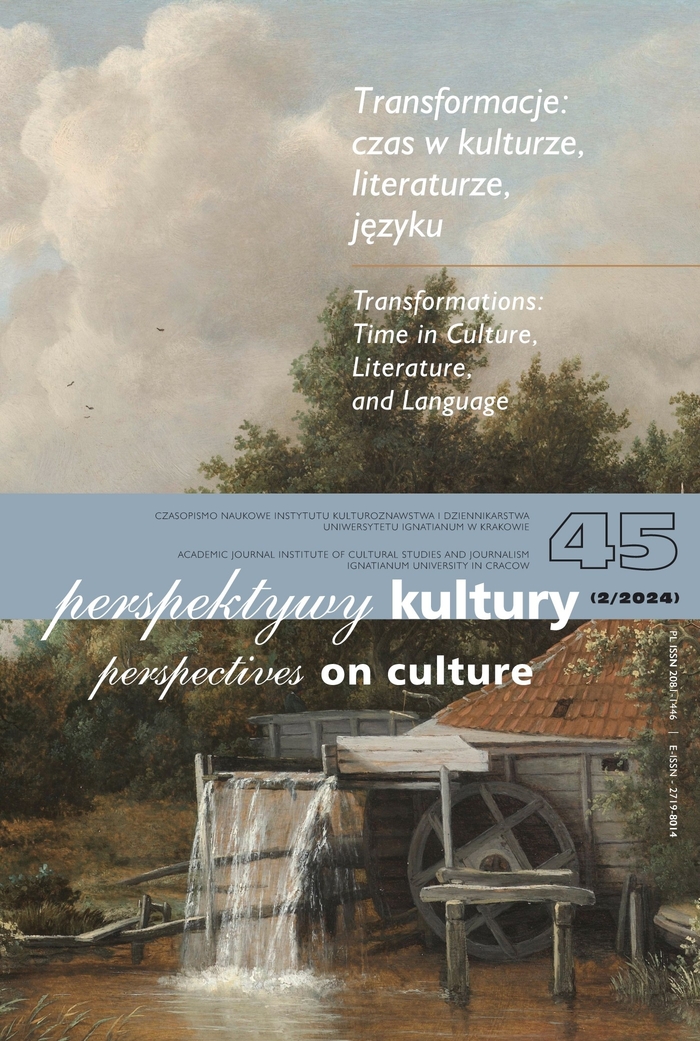Shakespeare’s Mixed Genres
Abstract
The problem of generic transformations to which Shakespeare’s plays bear witness is discussed against the ancient and early renaissance definitions and discussions of dramatic genres, from Aristotle through Plautus, Cintho, Castelvetro, Guarini to Sidney. The point of interest is located in the fuzziness in which comedy melts with tragedy (or the other way round) and yields in effect a new creation – tragicomedy. The wide range of Shakespearean comedy, tragedy, histories and Roman plays is briefly discussed in order to illustrate Shakespeare’s generic transformations, proving that traditional construction of dramatic genres, i.e., of tragedy, comedy and tragicomedy, was too narrow and too constraining for the early modern understanding of the condition of man.
References
Aristotle. Poetics.Translated by S. H. Butcher.
www.classics.mit.edu//Aristotle/poetics (access 12.07.2022)
Castelvetro, Lodovico. (1570) Poetica d'Aristotele vulgarizzata e sposta.
Castelvetro on the Art of Poetry, ed. & trans. Andrew Bongiorno (1984). Binghamton, NY.
Cinthio, Giraldi. Discourse or Letter on the Composition of Comedies and Tragedies (1543). transl. Daniel Javitch ( 2011).
https://www.journals.uchicago.edu/doi/pdf/10.1086/rd.39.41917488 (access 12.05.2022)
Gibinska, Marta. “The beauty of the World and the Quintessence of Dust: Shakespeare’s Deconstruction of the Renaissance Ideal of Man”. B.A.S (British and American Studies) vol. XXVI. 2020, pp. 129-142
Guarini, Giovanni Batista.(1590). Il Pastor Fido.
Il pastor fido: or The faithfull shepheard. Translated out of Italian into English. London: Printed [by Thomas Creede] for Simon VVaterson, 1602.
https://quod.lib.umich.edu/e/eebo/A02284.0001.001?view=toc (access 24 03.2022)
Hall, Edward. The Union of the Two Noble and Illustrate Famelies of Lancastre and Yorke (1548). https://internetshakespeare.uvic.ca/doc/Hall_H5_M/section/index.html (access 12.05.2022)
Holinshed, Raphael. (1577 and 1587). Chronicles of England, Scotland, and Ireland.
The Oxford Handbook of Holinshed's Chronicles. Oxford: Oxford University Press. (2013)
Mukherji, Subha. (2015). “The action of my life’: tragicomedy tragedy, and Shakespeare’s mimetic experiments”. Michaell Neill and David Schalkwyk (eds.). The Oxford Handbook to Shakespearean Tragedy. Oxford: Oxford University Press, pp. 267-284
www.academia.edu/13551078/_The_action_of_my_life_tragicomedy_tragedy_and_Shakespeare_s_mimetic_experiments (access 10.05.2022)
Plautus, Titus Maccius. Amphitrion. www. Gutenberg.org (access 12.04.2022)
Pollard, Tanya. (2015). Tragicomedy. Chapter 18, The Oxford History of Classical Reception in English Literature, Vol. 2: 1558-1660. Patrick Cheney and Philip Hardie (eds.). Oxford: Oxford University Press, pp. 419-432
https://www.academia.edu/19189784/_Tragicomedy_in_Oxford_History_of_Classical_Reception_in_English_Literature_2015. (access 07.05.2022)
Plutarch. Lives (Thomas North's 1579 English translation).
Translation by Bernadotte Perrin (1923). The Loeb Classical Library Cambridge, MA and London).
https://penelope.uchicago.edu/Thayer/e/roman/texts/plutarch/lives/home.html (access 12.01.2023)
Reiss, Timothy J. (1999). ‘Renaissance Theatre and the Theory of Tragedy’, in Cambridge History of Literary Criticism: Vol. 3: The Renaissance, ed. Glyn Norton. Cambridge pp. 229-247.
Sidney,Philip (1595). A Defence of Poesie and Poems.London. Paris & Melbourne: Cassell & Company 1891 https://www.gutenberg.org/files/1962/1962-h/1962-h.htm (access 14.03.2023)
Smith, Bruce (1988). Ancient Scripts and Modern Experience on the English Stage, 1500-1700. Princeton: Princeton University Press
Snyder, Susan. (2001) „The Genres of Shakespeare’s Plays”. The Cambridge Companion to Shakespeare, eds. Margreta de Grazia and Stanley Wells, pp. 83-98
Tasso, Torquato. Aminta (1537). Translated into English verse by John Dancer. Together with divers ingenious poems. (1660). London: Printed for John Starkey, at the Miter, near the Middle Temple-gate in Fleet-street, .
https://quod.lib.umich.edu/e/eebo2/A94684.0001.001?view=toc (access 10.04.2022)
Copyright (c) 2024 Perspectives on Culture

This work is licensed under a Creative Commons Attribution-NoDerivatives 4.0 International License.
Autor, zgłaszając swój artykuł, wyraża zgodę na korzystanie przez Wydawnictwo Uniwersystet Ignatianum z utworu na następujących polach eksploatacji:
- utrwalania utworu w formie papierowej, a także na nośniku cyfrowym lub magnetycznym;
- zwielokrotnienia utworu dowolną techniką, bez ograniczenia ilości wydań i liczby egzemplarzy;
- rozpowszechniania utworu i jego zwielokrotnionych egzemplarzy na jakimkolwiek nośniku, w tym wprowadzenia do obrotu, sprzedaży, użyczenia, najmu;
- wprowadzenia utworu do pamięci komputera;
- rozpowszechniania utworu w sieciach informatycznych, w tym w sieci Internet;
- publicznego wykonania, wystawienia, wyświetlenia, odtworzenia oraz nadawania i reemitowania, a także publicznego udostępniania utworu w taki sposób, aby każdy mógł mieć do niego dostęp w miejscu i czasie przez siebie wybranym.
Wydawca zobowiązuje się szanować osobiste prawa autorskie do utworu.





